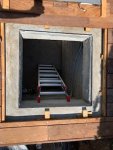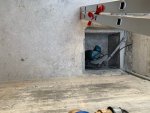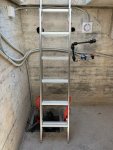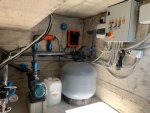Based on the
manufactures data chart and
this, chemical resistance of 37% HCL on Norprene is considered GOOD. no dilution needed for the pump tube itself.
The data for the polypropylene isn't promising. Looks like that may be your weak link and make the dilution necessary.
Thanks for checking, yes I think diluting is the safest option - and the more I've looked into it, the less I'm worried about it. I went and bought long chemical resistant gloves, protective eye goggles and a face mask.
I'm more worried about the potential issues of fumes from the HCL in the enclosed space, all the pool equipment is in an underground pit/basement where the only ventilation is two 100mm / 4 inch vent pipes, one of which has a humidity controlled bathroom fan installed.
Earlier in the thread I posted a schematic of one way to allow the acid container to suck air in as acid is dispensed, without having an open vent that fumes can easily escape from. I'm looking to find suitable containers and nipples to connect hoses, but I'm worried if I'll be able to make the connections sufficiently air tight that I won't have problems with fumes accumulating in the enclosed space.
From what I've read, HCL fumes are heavier than air and would accumulate at the lowest point, in my case that is the pit for the submersible pump, it is in a stainless steel box with a hole at the bottom that will drain into the soil below the machine room. If any fumes stay there, I can periodically rinse them out and they will end up in the soil below the machine room, but I'm not sure if I can rely on that, or if I risk the entire room being filled with acid fumes, and all the equipment being corroded as a result. Any ideas ?
Attaching pictures of the machine room.
Hatch in deck with entrance to machine room. The hatch is normally closed with a stainless steel cover and decking.

Below the ladder is the pit with the submersible pump, not visible here, but there is a drain hole to the soil below.

One end of the machine room, behind the ladder to the left is one of the 100mm vent pipes, to the right of the ladder is the other with the bathroom fan installed. The pipe in the middle is capped on the outside.

The other end of the machine room.
On the floor we have from the left:
1) the hydraulic pump for the cover
2) behind it the pipes to/from the pool
3) the pool pump
4) the acid tank with sulphuric acid still
5) the sand filter
Mounted on the wall we have from the left.
1) the SWG
2) the peristaltic pump
3) SWG + peristaltic pump controller
4) electric distribution board
5) control panel for pump etc.






